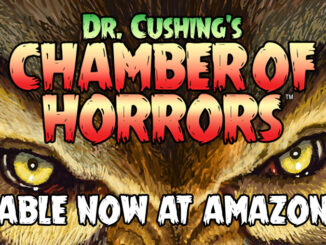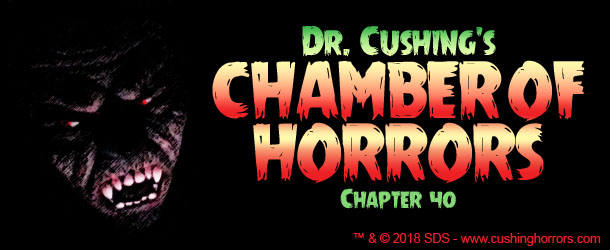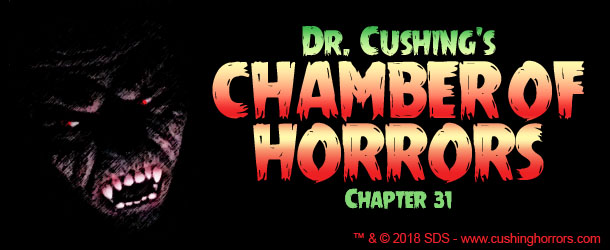
The Doll in the Window
A Dr. Cushing Chamber’s of Horrors Prequel
by Stephen D. Sullivan
Edinburgh Between the Two Great Wars – Christmastime
“Hey! Look out there!”
Opal Cushing seized the collar of the little girl’s coat and pulled the child back, out of the road and onto the snow-covered sidewalk, just in time.
The old-style horse and buggy rumbled unimpeded down the cobblestone street, the revelers it carried blissfully unaware of the near miss.
Brought to an abrupt halt, the girl immediately began bawling. She was dressed in a worn coal-black coat, unbuttoned, with a fine red Christmas frock beneath. No wonder the coachman hadn’t seen her amid the blowing snowflakes and the dark shadows of the deepening twilight.
“There, there…” Topaz said, kneeling in the snow next to the child, whom her sister Opal still held collared. “You’re all right. Everything is all right.”
The girl kept blubbering. She couldn’t have been more than seven—about half the Cushing twins’ age. Topaz glanced up at her dark-haired sister, who looked more like a stern zookeeper than a thirteen-year-old on her first solo Christmas shopping experience in an unfamiliar city.
The twins had traveled to Edinburgh with their father, who was off doing his own holiday errands. They’d come to the city on one of Dr. Cushing’s frequent quests to find new occult artifacts for the family museum—Dr. Cushing’s Chamber of Horrors—and because it was Christmastime, their father had agreed that the girls should travel along with him.
All three were staying at the home of friends, Kevin and Mary Hendryx, who owned a delightful Victorian house in Inverleith, not too far from the Royal Botanic Garden. It was the kind of place (and neighborhood) that the Cushings never could have afforded on their own, so the girls were excited to kip in such luxury while Father poked around the antique shops of Old Town searching for curiosities.
Both twins had also been thrilled when Father acceded to to their request to let them shop on their own, despite their newness to the city. The busy street smelled of excitement: roast meats, cookies baking, and hot chestnuts as well as bustling people, motorcars, and the occasional horse. Of course, saving the life of this weeping girl had brought the anticipated shopping to a sudden halt—which clearly annoyed Opal.
But at Topaz’s compassionate glance, Opal’s severe expression melted into sympathy. Because of the bond the twins shared since before birth, their emotions often mirrored each other. Opal couldn’t stay annoyed while her sister felt concerned.
“Topaz is right, moppet,” Opal said softly. As she knelt, the elder Cushing twin released the girl’s coat and straightened the child’s red woolen cap. “Everything is fine now. You can stop crying.”
“But it’s nae fine,” the girl insisted, rubbing the tears from her blue eyes. “It’s nae fine at all!”
“What’s the matter, little one?” Topaz inquired. “You’re safe now, and the carriage is on its way, too, none the worse. You were both lucky.”
“What’s your name, lass?” Opal asked. “Are you hurt?”
“I’m Amelia,” the girl replied, “and I’m nae hurt. It’s ma dolly…”
“What dolly?” Topaz said. She and her sister swept their eyes around the busy, snow-dappled thoroughfare, but neither spotted any sign of a doll.
Opal focused her intense-blue-green eyes on the waif. “Did you lose your dolly in the street?”
Amelia shook her head, looking as though she might burst into tears again at any moment. “She’s there,” she burbled, pointing to an aging toy shop on the far side of the street.
A pretty doll in a red dress, much like Amelia’s own, stood in the store window, ready for some lucky person to stop in and purchase her.
“Ma da’ is the dollmaker,” Amelia explained, moisture welling in her big eyes once more, “an’ he promised her to me—for Christmas. But she’s in the sales window an’…” She broke into tears again.
Both sisters hugged her. “I’m sure it’s just some kind of mistake,” Topaz explained.
“Come along,” Opal suggested. “We’ll see you across the street safely, so you can talk to your dad about it.”
Snuffling, Amelia wiped her sleeve across her face and nodded.
The twins stood and, one taking either hand, they led the girl safely across the street, crowded with Christmas shoppers.
As they reached the far sidewalk, Amelia broke from their grip, ran to the store window, and pressed her face against the glass—as if she might kiss the doll, which stood half her size, through the windowpane.
“Oh, I found you… I found you,” she cooed. “Now da’ and me will have the Christmas he promised.”
“Go in and see your father,” Opal urged, laying a guiding hand on Amelia’s shoulder.
“And you both have a Merry Christmas,” Topaz added.
The red-eyed waif nodded and quickly scampered to the shop door. “You have a merry Christmas, too!” she said, beaming. The shop doorbell gave a cheery peal as she hurried inside.
“Well,” Opal said, brushing her gloves theatrically, “that’s one thing off our hands.” Her breath hovered in a cloudy wreath above her head. “Now maybe we can get on with our own shopping.”
“Honestly, Opal…!” Topaz said with a chuckle. “You enjoyed helping that child just as much as I did.”
Opal’s blue-green eyes—so like Topaz’s own—glittered, reflecting the twinkle of the streetlamps. “Maybe,” she admitted. “But we still have a lot to do before meeting Father at the White Hart Inn.”
“Well, then…” Topaz grinned as she took her sister’s hand. “Let’s shop!”
Together they hurried into the deepening darkness.
An hour and a half later, the twins, arms draped with package-filled shopping bags, returned to Grassmarket, on their way to rendezvous with their father.
“I feel like Saint Nick,” Opal complained, shifting her burdens uncomfortably.
“Oh!” Topaz blurted as they passed the old toy shop. “Let’s stop in and see how things went for Amelia.”
Opal frowned. “It might be that her da’ had a different idea for that doll. Maybe he put it up for sale because they needed the money.”
“I suppose… But look! It’s not in the window anymore. Maybe he gave it to Amelia after all.”
“It can’t hurt to find out,” Opal agreed with a shrug.
The shop bell tinkled merrily as the twins stepped through the doorway. The air inside the shop was warm and smelled of coffee and old wood. The store’s furniture—and many of its toys, too—appeared to be antiques.
Though the place looked well maintained, Topaz spotted stubborn dust-bunnies clinging to the inside corners of the walls and the sparsely stocked displays.
A lean, middle-aged man with wire-rim glasses, thinning hair, and a grey beard sat on a stool behind the shop’s counter. He looked up as the twins entered.
Topaz smiled brightly as she and her sister approached. “Did Amelia like her doll?” Topaz asked.
The man blinked sharply, almost as though he’d been struck. “What did you say?”
“My sister asked if your little girl liked the doll with the red dress,” Opal elaborated.
The man’s blue eyes narrowed, and he gritted his teeth. “I dinna know what kind of cruel jest this is,” he said, his voice almost a growl, “but it is nae welcome—especially not on this night, of all nights!”
The sisters looked at each other, puzzled.
The shopkeeper stood, his stool scraping loudly across the worn wooden floor as he rose.
“I’ll be asking ye to leave,” he intoned. “And it’s only ’cause of the season that I’m not throwing you out on your bonnie ears! I’ve known English tourists to be cruel before, but this…!”
“We’re sorry, sir,” Topaz apologized, sadness and confusion warring in her breast. Clearly, they’d somehow wounded this man deeply. Did he and Amelia have some kind of quarrel over the doll?
She backed toward the door, but Opal stood her ground. “You can at least tell us what we’re supposed to have done.”
“Ye know very well what ye’ve done! Speaking of my daughter—and on this night, too!”
“But what did we do?” Topaz asked.
“Amelia said you’d promised her the doll in the red dress,” Opal explained.
Topaz continued her sister’s thought. “So, we brought her to the shop to talk to you about it.”
“She nearly got hit by a carriage on the way!” Opal snapped. “You should be grateful to us for escorting her across the street safely.”
The shopkeeper went pale. “Nearly…!” He staggered back and sat on his stool, almost tipping it over. “Escorted… But ye canna…!”
The anger on Opal’s face faded to confusion, and Topaz’s puzzlement grew, as well.
“We brought her across the street and right to the shop door,” Topaz insisted.
Opal nodded. “The bell rang as she scampered inside. It was only an hour and a half ago.”
The man shook his head, and tears welled at the corners of his eyes. He suddenly looked years older. “I was in the back when the bell rang, around then… But when I came to look, there was nob’dy here—nob’dy in the shop.”
“But that’s impossible!” Opal blurted.
“We both saw her come in,” Topaz agreed.
“Nae… Not impossible, lass… Just…” His voice broke. “Amelia—my own darling bairn—died ten years ago on this very night, run down by a carriage while trying to cross the street.” The shopkeeper pulled off his glasses, put his head in his hands, and wept.
“But… The carriage didn’t hit her. We spoke with her,” Opal protested. “We held her hands… We walked her across the street… We saw her enter the shop.”
Her sister’s confusion mirrored Topaz’s own. Clearly, the man was distraught. He couldn’t be pulling some kind of prank on them, but…
“Sir,” she ventured, “what happened to the doll in the window? Who came in and bought it?”
“Amelia said you’d promised the doll to her,” Opal put in.
“Aye,” the shopkeeper said, wiping his eyes. “I promised it to her for Christmas—a decade ago… But she died before I could give it to her. I’ve kept it all these years, but now… this year… With all the memories… I couldna stand to keep it any longer. That’s why I put it in the sales window. I hoped, if it left, it might take some of my pain with it.”
“So, who bought it?” Opal asked, groping for answers. “Was it some other little girl who happened to have the same name?”
The man shook his head. “Nae. There’s been nobody in the shop this evening, save the pair of ye.”
“But the doll is gone from the window,” Topaz pointed out, walking to the storefront. “Look for yourself!”
Slowly, the grey-haired shopkeeper rose and followed her, wiping his eyes. When he reached the window display, he put his glasses back on, and a look of wonder spread across his face.
“I canna believe it,” he said. “I never sold it, but…”
Opal took her sister’s hand and clutched it tight. “But maybe tonight,” she said softly, “after all these years…”
Topaz nodded, a strange mixture of sorrow and joy filling her breast. “…Amelia finally got her Christmas dolly.”
THE END
* * *
About the Story
Christmas 2021 was fast approaching and with it my need for a Yuletide horror story. I had an unpublished Cushing tale, “The Bride Reborn,” lying around. It’s a really good narrative, despite not being accepted into the anthology for which it was intended, but it’s not really a Christmas story. Plus, I’ve thought I might submit it to one or two of the few remaining horror/fantasy magazines, to broaden the audience for my Cushing Horrors series.
So, while I could have used that tale, I didn’t really want to.
Which left me with a “story deficit” for this Christmastime.
As is often the case when searching for a new yarn, I set my subconscious to working at it. Soon, I started seeing images of snowy evenings in Victorian-style settings and getting notions of antagonists that might be fun to work with. I spent an entire night researching Yuletide monsters—and then eliminating ones that the internet had culled from movies and TV shows. It ended up being a pretty decent list, if not terribly long. I’m sure I’ll use some of those creatures in coming years. (Ever hear of the Yule Lads?)
After stuffing my brain full of such grist, I had a struggle between the three competing visions in my head, one from long ago, and two more recent. One or two involved the Cushing Twins, while the other featured supporting players from past shorts and future Cushing books. None of the ideas really gelled though, transforming from images in my head into a complete story.
Trying to bring focus, I decided to write about the Cushing twins; it had been too long (2017) since I’d featured them in a Christmas story. That choice eliminated the olde time Dickensian idea. I also wanted something ghostly; requiring that crossed out another possibility.
In my head, I saw Opal and Topaz Christmas shopping. When I tried to move the story idea away from that setting, it kept coming back. So, I stopped fighting the notion.
Where were the girls shopping and when in their lives? And how did it turn out? Were they rescued… or rescuers? Where was their dad, Dr. Leigh Cushing, in all of this?
These notions were still bubbling in my brain on Monday, December 20th—the week of Christmas. The day itself crept ever nearer, as did our family’s holiday gathering, pushed ahead of the actual date by work schedules and the pandemic.
I needed to get this tale done, and I could feel the story in my brain. The plot was so close, I could almost grab it, but it kept slipping past my cognitive fingertips.
Sometimes, ideas in your head clog up, keeping other notions trapped in the back of your mind, rather than letting them travel up front where you can use them. That’s how it works with me, anyway.
So, I took up my commonplace and started writing down the ideas floating around in my head. As the story elements… shopping… lost child… doll… went onto the paper, I asked myself questions about them. I wrote down the answers, which spurred more questions and then…
The fragments came together and resolved themselves into the story you just read. All the pieces in the notebook and in place, easy as pie. (Ha!)
A quick outline after the notes, and all that remained was the annoying task of actually writing the thing. “Why don’t the stories just spring out of my head full-blown like Athena from Zeus’ brow?” I asked my friends David and Derek.
Because that’s not the way it works.
Ass in the seat and fingers on the keyboard are the difference between the writer and the non-writer.
But happily, this was a pretty easy-breezy writing job, and it went quickly despite pauses to look up things about Edinburgh, Scotland, where I’d decided to set the tale.
I think the end result is both touching and creepy—in that traditional, English/Scots Christmas Ghost Story way.
I hope you like it.
Merry Christmas.
Have a Safe & Happy 2022!
—Steve Sullivan
21 December 2021






